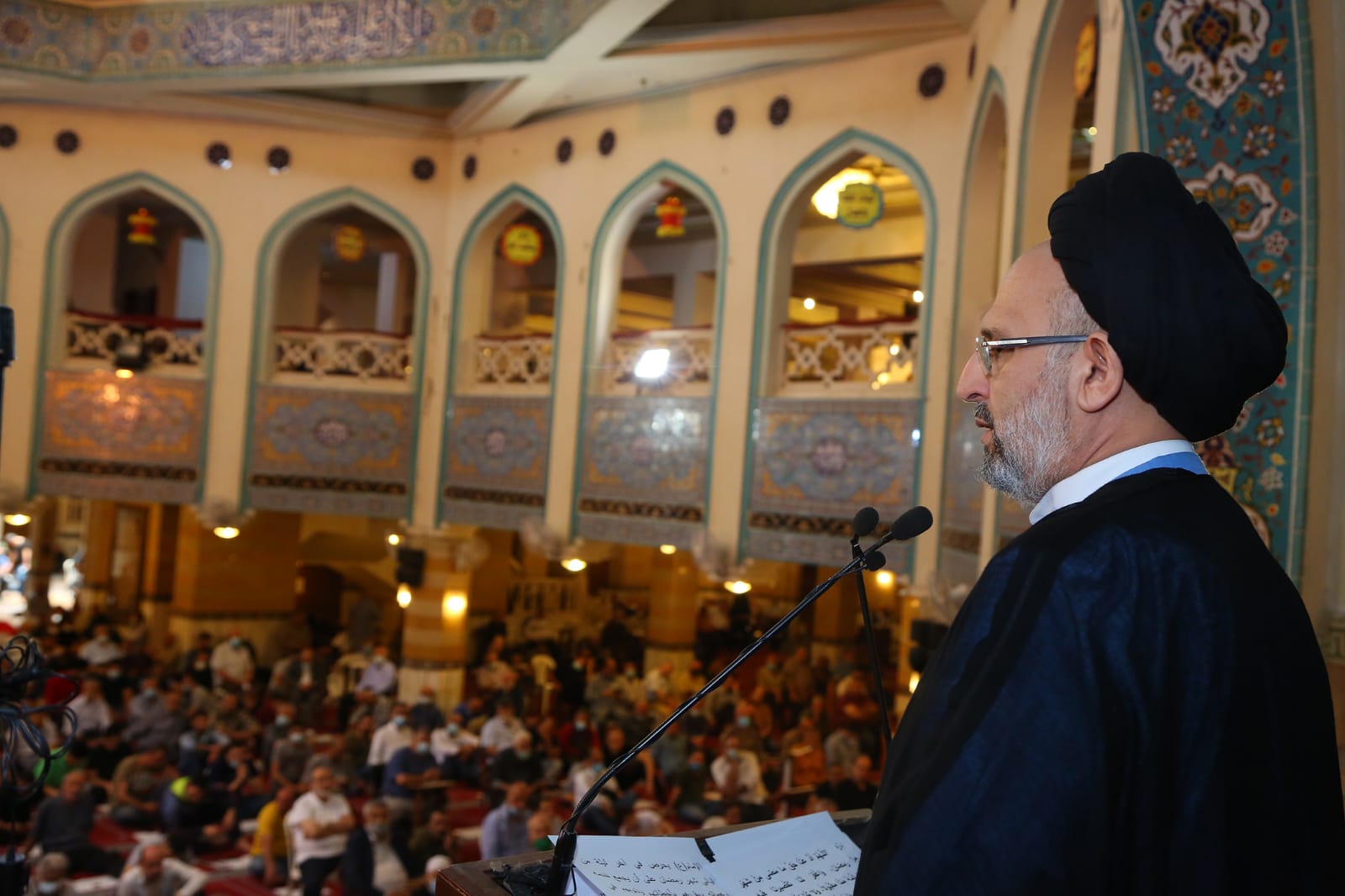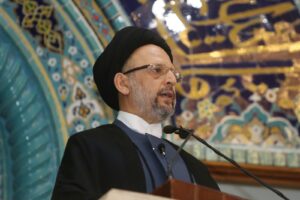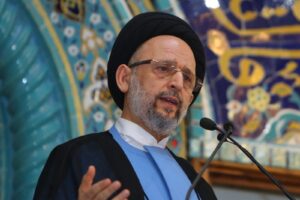In The Name of Allah, The Compassionate, The Merciful
.
His Eminence, Sayyed Ali Fadlallah, delivered the two Friday prayer sermons at the Imamain Al-Hassanain Mosque, Safar 4, 1446/August 9, 2024. Several prominent religious scholars, dignitaries, and hundreds of believers attended the Jumu’a prayer. Following is a summary of the sermons.
Teachings of Imam Hassan
The First Sermon
Allah, the Most Exalted, says in His Glorious Book: Indeed, God wills to remove from you the impurity O people of the [Prophet’s] household, and to purify you with [extensive] purification} God has spoken the truth.
On the seventh of the month of Safar, we remember a sorrowful occasion for the followers and lovers of the Ahl al-Bayt ,which is the anniversary of the death of the second Imam of the Ahl al-Bayt, Imam Hassan ibn Ali (a.s.). This Imam is among those in whom the verse that we recited was revealed, and those whom God commanded us to love when He said: {Say, I do not ask you for any reward except love for my near relatives}, and about whom the Prophet (p.) said, “I am leaving among you two precious things; as long as you hold onto them, you will never go astray after me: the Book of God, and my progeny, the people of my house.”
A Prophetic Upbringing
This Imam was blessed with the upbringing of his mother Fatimah al-Zahra, his father and with the special care of his grandfather, the Messenger of God (p.). It was the Prophet who named him with a name that no one before him had been given. The Prophet expressed his love for him and prayed to God for him, saying, “O Allah, I love him, so love him.” The character of the Messenger (p.) was reflected in him, both in appearance and in manners, which the Prophet pointed out by saying, “You resemble me in both appearance and manners.” People would look at Imam Hassan whenever they longed to see the Messenger of God and they would find in him the knowledge, patience, worship, asceticism, humility, generosity, and kindness of the Prophet.
After the death of the Messenger, Imam Hassan supported his father, the Commander of the Faithful, in carrying the burdens of the caliphate. He was his father’s support and right hand in difficult tasks and stood by him in the battlefields, such as in the battles of Jamal, Siffin, and Nahrawan, where he displayed courage and valor. The Commander of the Faithful even feared for him due to his intense bravery…
Difficult Challenges
Imam Hassan (a.s.) assumed the caliphate after the martyrdom of his father, the Commander of the Faithful , during one of the most difficult and critical phases. Perhaps the most prominent challenge he faced was from Muawiyah, who refused to pledge allegiance to Imam Hassan. Not only did he refuse, but he also led an army to prevent the Imam from taking the reins of power. This prompted the Imam to mobilize his companions to repel this aggression, and he prepared an army estimated at forty thousand horsemen. However, the Imam ultimately preferred to enter into a peace agreement, seeing it as the right and realistic choice at that stage. This decision was made after Muawiyah had succeeded in winning over many of Imam Hassan’s army with bribes and after the Imam realized that engaging in a battle would be militarily unwise and would lead to the sacrifice of his loyal companions. At that time, many people were unaware of the true nature of Muawiyah and his destructive project for Islam, as a large group of Muslims regarded him as one of the companions .
Imam Hassan sought through the peace treaty to reorganize his army, rid it of the weakness that had afflicted it, and give people the opportunity to see the reality of Muawiyah. Indeed, subsequent events validated Imam Hassan’s stance, as people saw Muawiyah shed the blood of the followers of the Prophet’s household and his companions, disregard the peace treaty… This was followed by his appointment of his son Yazid—a corrupt, immoral man who killed innocent souls—as his successor, despite the peace treaty stipulating that the caliphate would pass to Imam Hassan after Muawiyah, and if anything happened to him, to Imam Hussein .
Muawiyah also poisoned Imam Hassan through his wife, whom he had bribed to carry out this act, clearing the way for his son Yazid. This eventually set the stage for the revolution of Imam Hussein and the subsequent outcomes.
As we remember this painful occasion, we reflect on some of Imam Hassan’s words and teachings, which he shared with his companions, to guide us in our lives.
The first hadith points to the reason for the destruction of individuals and societies. The Imam said: “A person’s downfall lies in three things: arrogance—which means that a person admires themselves and sees themselves as superior to others because they possess wealthstatus, knowledge, or a clan, without recognizing the abilities, capabilities, and qualities of others—greed—which means coveting worldly matters and not being satisfied with what one has, even though it meets their needs—and envy, which is wishing harm upon others because they have what one does not.
Arrogance, as Imam Hassan asserted, is the destruction of faith, and through it, Satan was cursed and expelled from Paradise. Regarding this, Imam Ali said: ‘Take heed from what God did to Satan when He nullified his long-standing worship and arduous effort, as he had worshipped God for six thousand years because of his arrogance for just one hour.’
– Greed is the enemy of the soul, and it was through it that Adam was expelled from Paradise when he and Eve ate from the tree that God had forbidden them to eat from. Envy is the precursor to evil, and it was through it that Cain killed Abel.”
The second hadith refers to the qualities of those who deserve to be called Shi’a. The Imam responded to a man who claimed to be one of their Shi’a and supporters by saying: “O servant of God, if you obey us in our commands and prohibitions, then you are truthful. But if you do otherwise, do not add to your sins by claiming a noble status that you do not possess. Do not say: ‘I am one of your Shi’a,’ but rather say: ‘I am one of your supporters, lovers, and adversaries of your enemies.’ In this, you are in good standing and on the right path.” Thus, Shi’ism is not merely an emotional affiliation but a commitment to what the Ahl al-Bayt brought and what they forbade, as well as an expression of what was conveyed by the Messenger of God
Imam Hassan defined politics by saying: “Politics is to observe the rights of God, the rights of the living, and the rights of the dead. As for the rights of God, they involve fulfilling what He has commanded and avoiding what He has prohibited. The rights of the living require you to fulfill your duties towards your brothers, not to neglect serving your community, to be sincere to the leader as long as he is sincere to his people, and to raise your voice against him if he strays from the right path. As for the rights of the dead, they involve remembering their good deeds and overlooking their faults, for they have a Lord who will hold them accountable.”
Guidance from His Life
Dear ones, as we commemorate the anniversary of this Imam’s departure to his Lord as a master in Paradise, we should not limit ourselves to expressions of sorrow and holding mourning sessions for him—though he certainly deserves them for his struggle, sacrifices, sufferings, and trials. Rather, we should also strive to follow his example, be guided by his words, which illuminate our lives and make us more aware and responsible, and call others to follow this guidance. By doing so, we remain true to this Imam, show our loyalty to him, revive his teachings, and become among those who are worthy of his intercession on the Day we meet God.
The second sermon
Worshippers of Allah, I advise you and myself with what Imam Hassan advised His Brother, Imam Hussein :
“I advise you regarding those I leave behind from my family, my children and our household… Be forgiving toward those who wrong them, and accept from those who do good to them. Be a protector and a father to them… and bury me beside the Messenger of Allah, for I have more right to him and his house than anyone who entered his house without his permission… I implore you by Allah and by the kinship that Allah has drawn between you and the near relationship to the Messenger of Allah, do not shed even a drop of blood because of me until we meet the Messenger of Allah and argue our case to him, informing him of what the people did to us after him.”
Dear ones, we are in dire need of drawing inspiration from this will, through which Imam Hassan expressed his deep concern for preserving the blood of Muslims, despite his desire to be buried beside his grandfather, the Messenger of Allah (p.). This example can help us address our current reality, where we suffer from a situation where violence has become the means to resolve disputes and conflicts, even over something as trivial as the right of way. Instead of resorting to violence, we should adhere to the verse: {And if you disagree over anything, refer it to Allah and the Messenger}, which would prevent much bloodshed and make us more aware, responsible, and capable of facing challenges.
Responding to the Enemy
We begin with the tension that the Lebanese are experiencing after the decision by the Resistance to inevitably respond to the aggression that took place in the southern suburbs. This decision aims to prevent the enemy from repeating and escalating its attacks, considering the potential consequences that may arise, including a possible retaliatory response…
In light of what is happening, we call for vigilance and preparation for the consequences of any response, taking into account all possibilities, as we are dealing with an enemy that acts without restraint or accountability, showing no regard for values or human feelings. We also call for trust in the wisdom of the resistance, which has clearly stated that its response will not be hasty or reactionary, but rather wise, considering the objective conditions of the country and its people.
At the same time, we urge everyone not to fall into the trap of psychological warfare conducted by the enemy and its supporters, which aims to deepen divisions among the Lebanese and push them to make concessions for the sake of the enemy’s settlers and entity. This calls for us to summon our spiritual, faith-based, and material strengths, to be aware of the enemy’s weaknesses and the limitations of its actions. If we are suffering, so too is the enemy—perhaps even more so. If we are afraid, the enemy is also afraid, and its fear is greater than ours. If we are experiencing displacement or the loss of loved ones, the enemy is also suffering.
We do not intend to underestimate the enemy’s capabilities, technological advancements, or the vast and unlimited support it receives. However, this should not cause us to overlook our own capabilities and potentials, some of which have proven their effectiveness, while much remains unseen. We have a high readiness to give and sacrifice, as well as support from those who believe in the just cause that the resistance upholds, both domestically and internationally.
In these circumstances, we are in dire need of unity, solidarity, and cooperation to face the current challenges, particularly the burden of displacement from targeted areas or those feared to be targeted.
Exploiting the Suffering of the Displaced:
It is unfortunate to witness the exploitation of the suffering of displaced citizens, which extends beyond the significant increase in rent prices to include demanding several months of rent in advance and limiting the number of family members allowed to stay. This has made safety accessible only to the wealthy and well-off.
While we commend all calls for opening doors wide for the displaced and those who have opened their homes to them, we also urge the relevant ministries, municipalities, and active entities to intervene and stand against those who exploit crises at the expense of their nation and humanitarian values. At the same time, we call on political, party, and religious leaders, and those with a presence on social media, to refrain from making statements, positions, or tweets that harm national unity and incite the Lebanese against one another.
We understand that there are deep-rooted and significant disagreements among the Lebanese, but this should not lead to actions that threaten the very existence of the country, benefiting the enemy in its war against all of Lebanon. Today, the enemy threatens the infrastructure of all Lebanese people and spreads fear through its statements or by breaking the sound barrier.
We reiterate that the Lebanese must emerge victorious from this battle, securing their dignity, honor, and safety, and claiming their place in a world that respects only the strong.
The Cohesion of the Resistance in Palestine
Returning to Palestine, we commend the resistance for swiftly electing a new leader just days after the assassination of Ismail Haniyeh, the head of the political bureau of Hamas. This move serves as a practical response to the assassination and confirms the resistance’s cohesion and strength by choosing a leader who remains within Gaza, continuing to fight the enemy.
At this time, the Palestinian people continue to make sacrifices and achieve successes that compel the enemy to realize that its only option is to withdraw and yield to the demands of the Palestinian people, which call for an end to the war, the return of people to their homes, the lifting of the siege, and the rebuilding of what has been destroyed.




